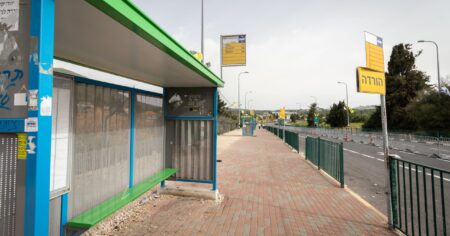The Executive Committee of the Palestine Liberation Organization (PLO), the umbrella organization that is internationally recognized as the representative of the Palestinian people, will push to withdraw formal recognition of Israel and end Washington’s longstanding role as mediator of the peace process. Instead, the PLO will pursue an “international formula” for achieving statehood. The developments were outlined in a report that aims to redefine not only the parameters for future relations with Israel and the United States but also change the status of the Palestinian Authority from a “transitional authority” to a “state under occupation.” The details are intended to be finalized in a follow-up meeting of the PLO mid-month.
The PA was formed as an interim governing body by the 1993 Oslo Accords—signed by then-prime minister Yitzhak Rabin and previous PLO chief Yasser Arafat—and was meant to be dissolved after no later than five years as part of a final peace agreement.
Two-and-a-half decades later, the PLO is now threatening to do just that, which, in its view, would release the Palestinians from political obligations stipulated in agreements with Israel.
According to PLO Executive Committee member Ahmed Majdalani, Israel “didn’t commit to any of the terms,” thereby effectively absolving the PA of its responsibilities. “I believe we are late in making these decisions and implementing them,” he told The Media Line, “which has created a gap between the Palestinian leadership and the Palestinian people.”
In this respect, there does, indeed, appear to be a growing chasm between the PA and the Palestinian “Street,” with a number of individuals expressing to The Media Line a distrust of Ramallah, the administrative capital of the Palestinian Authority. One businessman, who spoke to The Media Line on condition of anonymity, called on PA leaders to resign, as they are no longer “qualified” to make decisions “that have no impact on the ground.”
Another Palestinian, Bashar, noted that PLO leaders have made similar threats numerous times in the past, yet cooperation with Israel, security coordination foremost, remains intact. “They practice double standards,” he exclaimed, whereas another person, who asked not to be identified, went so far as to suggest that the PA shares “mutual interests” with “the [Israeli] occupation” and thus cannot be expected to advance the Palestinian cause.
Even those supportive of the PLO’s newly stated goals do not believe that they will be implemented. “These decisions might be good for Palestine,” one Ramallah resident told The Media Line, “as they could potentially change the [negative]situation caused by the Oslo Accords.” Nevertheless, she qualified, “I don’t think the PA is capable of forging a better agreement unless they focus on a national agenda to support the Palestinian public.” Many other Palestinians echoed these sentiments, calling on the PA to change course after years of failed negotiations.
To this end, Saeb Erekat, Secretary General of the PLO Executive Committee and chief Palestinian negotiator, reiterated on Tuesday the PA’s refusal to engage in any peace initiative sponsored by the US unless the Trump administration retracts its recognition of Jerusalem as Israel’s capital. This comes after Erekat earlier this month slammed American threats to cut aid to the Palestinians, describing the prospect as tantamount to “starving refugees…in support of Israeli positions.”
Nevertheless, Erekat appeared to leave the door open for a rapprochement, saying that while the Palestinians do not want to clash with Washington, President Trump had left them with no choice.
As such, Abbas is expected to boycott US Vice President Mike Pence when he visits the Middle East later this month. The PA chief is tentatively slated to travel on January 22 to Brussels—thus precluding the possibility of hosting Pence in Ramallah—where he will attempt to curry favor from Western European countries which uniformly opposed President Trump’s Jerusalem declaration.
Pence will nonetheless meet with Egyptian President Abdel Fattah al-Sisi and with Jordanian King Abdullah II on January 21; this, before spending two days in Israel. The American vice president is scheduled to address the Israeli parliament and visit the Western Wall, Judaism’s holiest site, a move that could spark further controversy due to its location in East Jerusalem, conquered by Israel in the 1967 war and which the Palestinians claim as their future capital.
Originally posted at Jerusalem Post.



